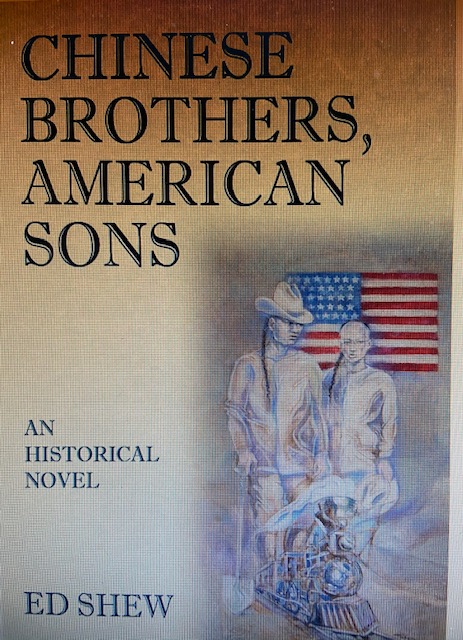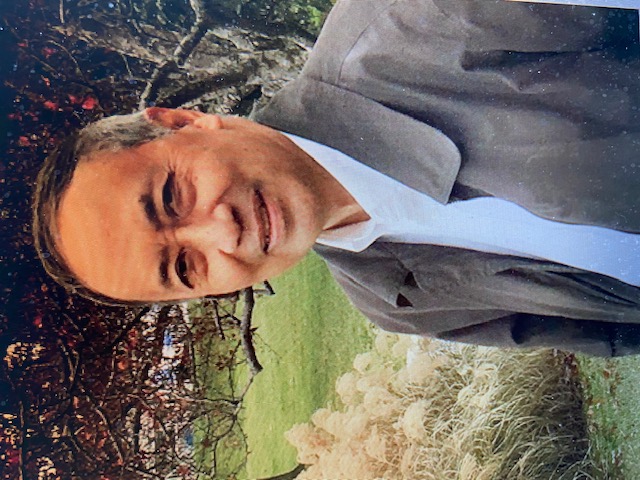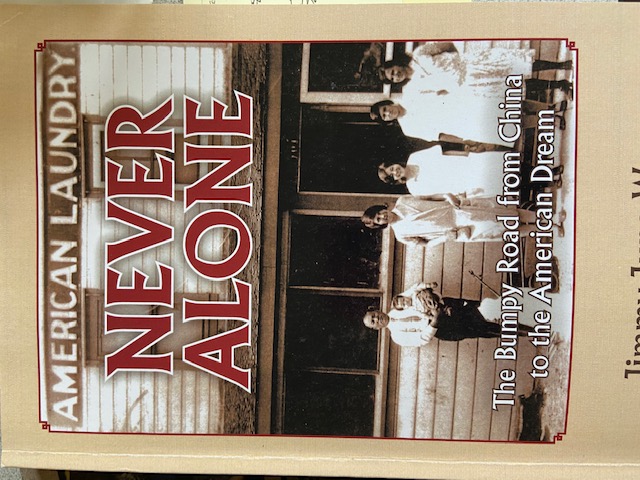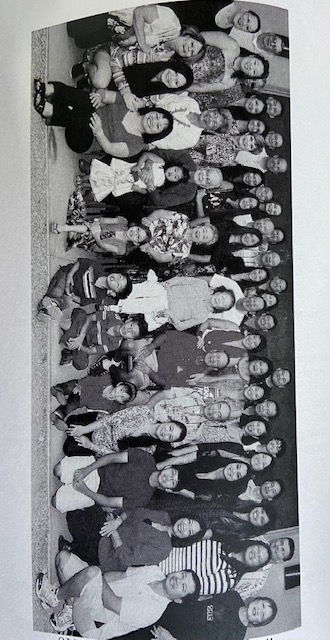
CHINESE AMERICAN BOOKSHELF
CHINESE AMERICAN HISTORY FOR YOUR BOOKSHELF
BY Gerrye Wong December 2020
Today I want to share some wonderful books by first time authors that have come across my desk. What better time than this pandemic for so many of our fellow Chinese Americans to finally find the time to sit back and share their family story with readers and lovers of American history.

Although Ed Shew was born in St. Louis, Missouri and never grew up among a Chinese American community, he always was interested in the struggles of Chinese immigrants settling in America. It was in retirement that he finally had a chance to do research and write a book about their immigrant struggles. Shew’s book, CHINESE BROTHERS, AMERICAN SONS, tells the little-known story of the Chinese men who conquered building the toughest part of the Transcontinental Railroad. In a fictionalized story, he tells the story of these brave men through the eyes of two brothers, Li Chang and Li Yu, who come to san Francisco in 1854 in search of the riches of the Gold Mountain as told to them in their villages in China. Their lives were one of being the target of racism in all of their endeavors of trying to make a life in America, and yet Shew’s book depicts their lives of one of hope and triumph.
As Shew told about his own life, he said he always wanted to “fit in” with his Caucasian friends growing up. In his book, he shows how every group that has immigrated has struggled to “fit in” while battling hatred and discrimination from the establishment through his two characters. Explaining his own background, Shew said, “Born in 1949, my siblings were born in Chinatown aka “Hop Alley” in downtown, St. Louis, Missouri. There were few Chinese back then in St. Louis and those we knew ran Chinese hand-laundries. As a seventy-one year old American of Chinese ancestry, I must admit I haven’t always felt Chinese although I was reminded many times that as Chinese, I am different and my family and I, painfully did not “fit in”. The research and writing of this historical novel has enabled me to go back to my roots, a journey I regret not traveling earlier. “

Ed Shew’s first novel, admittedly 9 years in the making, celebrates and illustrates the struggles and achievements of a largely ignored group in the rich history of the United States. Through the lives of his two main characters, we feel the loneliness, pain and disappointment they felt trying to make a life for themselves so they could send money back to their families in China. Their dogged determination to carry on in the face of rampant discrimination and unfair treatment is told vividly through the many scenes of their harsh lives working on the railroads with thousands of other Chinese laborers.
 Wei Wang
Wei Wang
Explaining his motive for writing it, Shew said, “With this book, I hope to help people understand the racism and demonization that the Chinese went through, all the hardships and struggles they endured when searching for gold and building the railroad. While not America’s finest moment in the treatment of the Chinese, it was a defining moment in American history. This railroad laid the foundation for the extraordinary economic prosperity enjoyed by the United States in the years that followed.”
Books may be purchased through Amazon or Barnes and Noble websites or directly through the author at Ed Shew, 2000 Abby Ct., Lake St. Louis, MO 63367 tshew@msn.com 636-614-6717 PayPal or Venmo or check for $20.53 accepted.
BITTER ROOTS – Five Generations of a Chinese Family in America by Bruce Quan Jr. is his family’s story of one Chinese family whose ancestors first arrived in America in the 1850’s. In the story, it is also an account of survival in the face of fierce anti-Chinese sentiment since the nineteenth century while also examining the continuing underlying racism pervasive in our own lives to this day. In explaining his book, Bruce says, ‘This account of five generations of my family’s life in America could simply be called an historical drama. It all began in 1868 when my great grandfather, 11 year-old Lew Hing, was sent by his parents to America to join an older brother to work in his Dry Goods store. Speaking no English, he worked with his older brother who fortunately saw his value would double if he could speak English so he enabled the young boy to go to school in addition to his working.

This began the young man’s rise to business so that at his death at age 77, he was known as Lew Hing, Chinese immigrant boy, who became an American captain of industry and the patriarch of five succeeding generations who have melded into the American way of life today. As Quan explained, “My characters are all people who lived and breathed and walked the earth of China and California, from the 1850s to the present day. The hardships they endured, the successes they wrested all are true although at times harsh and almost unbelievable as they fought against tight-fisted gasp of the “White Devils.” But we persisted, and built a legacy of hard work, self-determination, dignity, worth and family strength.”

Reading about the subsequent families’ history is a fascinating tale of aligning oneself with the Caucasian majority during periods of extreme to milder forms of discriminatory racism. How Lew Hing and the Chinese community at the turn of the century met challenges is indeed a story of determination above hardship and discriminatory attitudes against the Chinese people during those early years. As Bruce Jr. proudly relates, “My great grandfather, Lew Hing, founded the Pacific Coast Canning Company in West Oakland in 1905, which was one of the largest employers in the City of Oakland.” Bruce Jr. himself has a long list of accomplishments himself, as a fifth generation Californian. As a young man, he was a community activist for social justice, participating in the Free Speech Movement. One time UC. Berkeley Student Body President, the Berkeley law School graduate open law practices in Oakland and San Francisco before moving his family to Beijing, continuing his law practice and teaching in Peking Law School.
It is always a fascinating read when a fifth generation member of a Chinese American family tells the story of his own family. Bruce throws in historical happenings his family lived through, and being an Oakland resident myself at one time, I found the Quan family story especially interesting. To contact the author: send email to bruceqj@prodigy.net. Book copies can be purchased on Amaon.com. Pick up BITTER ROOTS and I hope it inspires you to someday writing your own family history book. Good work, Bruce.
Another book newly published, NEVER ALONE comes from Tucson, Arizona authored by Dr. Jimmy June Wong. I was fortunate a dozen years ago to have met Dr. Wong, when he used to host the most prestigious and popular golf tournament for the Federation of Chinese American Golf Organizations in his hometown annually. Busy in that golf community then as well as active in his dental practice and community, Jimmy admits it wasn’t until retirement that he had the opportunity to think and write about his family history.

To quote Jimmy, he admits, “Now that I’m in the eighth decade of my life and the youngest of a family of twelve children, it’s time for me to tell the story of where I came from, where I went and why I am here. Our story begins with my grandfather, Wing Hin Ock…If my grandfather had not made plans to leave China to find a better life for my family, I would likely be in China now, scratching out a meager existence in a rice field.” Jimmy dedicated the book to his sister Margaret, age 94 at the writing, who, he said, had the unique inborn sense of family. He was grateful for her infinite wisdom of preserving and finding enough facts about the family she loved so he could weave a story about growing up in a large family in a small town during historical eras including the Great Depression, Chinese Exclusion Acts, World War II and subsequent events that the Wong family was part of.

Wong’s over 200 page book tells of the difficulties of the Wong family to put down roots in America in Arizona. Facing constant fear of deportation, the family struggled to create businesses like the American Laundry and the American Kitchen with the big family members all working in the family businesses besides working hard in school, as the father always expected.
Wong’s family story begins with his grandfather leaving his village in China to travel to Mexico, which was more welcoming than the United States to Chinese immigrants. Working in gold mines there, he saw the Mexican natives resented the Chinese willingness to work for lower wages, so for safety, he came to the American border of Nogales when Arizona was a U.S. territory, not a state. He managed to work in small mines there but soon set out to reach San Francisco where he hoped to work in rich California mines. Through guidance from the Wong Benevolent Association who helped those with the same Wong surname, he married and sired a son, but had struggles finding work.
Finding out canneries in Alaska were hiring Chinese for the usual reasons – they worked harder for less money, Wong Hin Lock left his family to work in Alaska and found life and work much easier and lucrative enough to send money to his wife and young son. Unfortunately, his wife died leaving a three year old son, so he was raised by many families, and looked after through the aid of the Wong Association . His father recalled living with the confines of San Francisco’s Chinatown throughout his youth, fearful of dangers beyond its confines, but at 17, decided to find work elsewhere, so hearing of work in the Arizona mines, ventured there. With his ability to speak English, he held important jobs managing the kitchens while the other Chinese miners worked hard to build railroad lines.
Jimmy Wong’s story follows his father’s eventual three journeys back to China to procure a wife, a common practice at that time before settling in Flagstaff, Arizona, to open the American Laundry, which ultimately grew into a successful business. A winning $20,000 lottery ticket from San Francisco helped the family’s future and WJ soon opened the American Restaurant and the two businesses were well known in town, as was the patriarch and his large family.
In retrospect, Jimmy Wong says of his forbearers, “Although my grandfather, Wong Hin Ock, emigrated to the North American continent to escape hardships of life in China, he never realized the American Dream that was impregnated in his mind. Like his father who left China, WJ, Jimmy’s father courageously left San Francisco where he was born and lived almost all of his life under the terms of the Chinese Exclusion Acts of 1882 and 1892. He almost achieved most of his Dream before his untimely death, but he would be proud of his children and their accomplishments.” I found the story of this three generation Chinese American family most informative of what life was like during that period of American history in small town Arizona.
To order copies of book, email x2thdk@aol.com. For more information, check www.Orajimpress.com.

I appreciate the recommendations of Chinese American bookshelf. This is indeed a great time for reading and reflecting.
Ed Shew’s, 1st historical novel, is an eye-opener. What the Chinese men did for this country is unbelievable. Only the Chinese culture could w/stand such ‘pure torture.’ A must read for ‘all.’ –Nona Mock Wyman / author